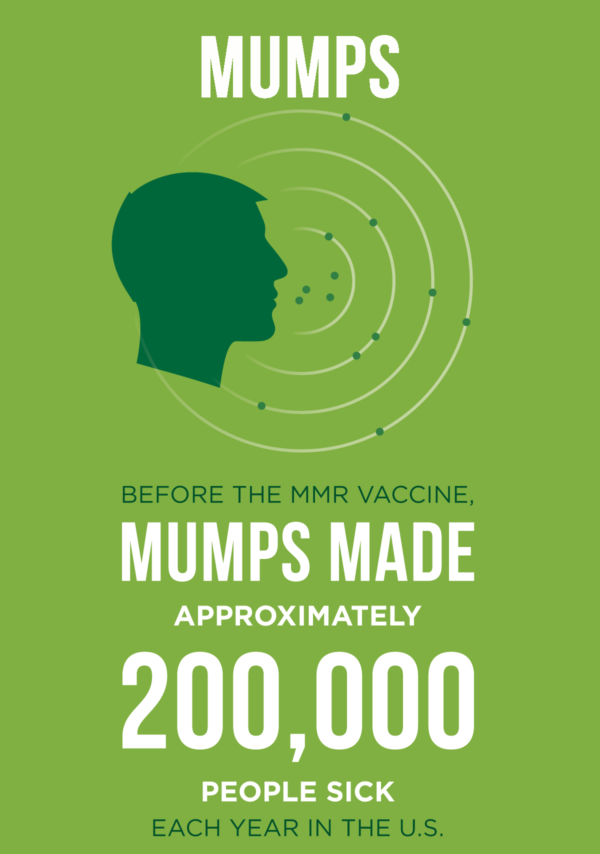Mumps
What is mumps?
Mumps is a contagious viral disease spread through coughing, sneezing, and close contact with infected individuals, including regular conversation. The most noticeable symptom is swelling of the salivary glands, which causes the cheeks to puff out.
On this page, you can explore how mumps spreads, who is at risk, what the symptoms are, long-term health effects, how to prevent mumps, and information on mumps outbreaks.
before symptoms begin is when mumps is most contagious.
How does mumps spread?
Mumps is a viral infection that spreads through direct contact with saliva or respiratory droplets from the mouth, nose, or throat. The virus is transmitted through:
- Coughing, sneezing, or talking
- Sharing items contaminated with saliva, such as water bottles or cups
- Engaging in close-contact activities, like playing sports, dancing, or kissing

Anyone who is not vaccinated against mumps is at risk. People in close-contact settings, such as school children, college students, and healthcare workers, are more likely to contract and spread the disease.
Additionally, traveling to areas outside the U.S. where mumps is more common increases the risk of infection.
People are contagious starting a few days before their salivary glands begin to swell and can remain contagious for up to 5 days after the swelling begins.
What are the symptoms of mumps?
Some children infected with the mumps virus have either no signs or symptoms or very mild ones. When signs and symptoms do develop, they usually appear about two to three weeks after exposure to the virus and may include:
- Swollen glands under the ear or jaw
- Fever
- Headache
- Fatigue
- Loss of appetite
- Muscle aches

Are there any long-term health effects associated with mumps?
Although mumps is typically a mild illness, it can lead to complications such as meningitis (swelling of the brain and spinal cord) and deafness. Additionally, about one in four teenage or adult men with mumps may experience painful swelling of the testicles, which, though extremely rare, can lead to infertility.
How can I prevent mumps?
Vaccination provides the best protection against mumps. There are two mumps-containing vaccines available in the U.S. The MMR vaccine protects against measles, mumps, and rubella. The MMRV vaccine protects against measles, mumps, rubella, and varicella (chickenpox).

Babies and Children
For the best protection against mumps, the CDC recommends that children get two doses of MMR or two doses of MMRV vaccine:
- The first dose at 12 through 15 months of age
- The second dose at 4 through 6 years of age
Your child’s healthcare provider can help decide whether your child needs the MMRV or MMR vaccine.

Teens/Young Adults
The CDC recommends that students at post-high school educational institutions who do not have evidence of immunity to mumps get two doses of MMR vaccine, separated by at least 28 days.

Adults
Adults born before 1957 have probably been exposed to mumps virus and are likely immune.
The CDC recommends that adults who do not have evidence of immunity get at least one dose of MMR vaccine.
How common are mumps outbreaks?
Outbreaks in the U.S. continue to put people at risk of mumps and its complications. To find information about mumps outbreaks and to view the number of cases/years, see CDC’s Mumps Cases and Outbreaks web page.
CDC Recommended Vaccination Schedules
To ensure that your entire family is up to date on their vaccines, check out the following CDC recommended immunization schedules and talk to your healthcare provider.
Mumps remain a common disease in many parts of the world. Anyone who is not protected against mumps is at risk of infection when traveling internationally. The CDC recommends the following mumps protection before international travel:
- Infants aged 6 to 11 months should receive one dose of the MMR vaccine (they will still need two additional doses at the recommended ages).
- Children 12 months and older should receive two doses of the MMR vaccine, separated by at least 28 days.
- Teenagers and adults without proof of immunity to mumps should receive two doses of the MMR vaccine, separated by at least 28 days.
The MMR vaccine is not effective in protecting individuals who have recently been infected with mumps. However, getting vaccinated after exposure is not harmful and may help prevent the disease if the person is later re-exposed.


